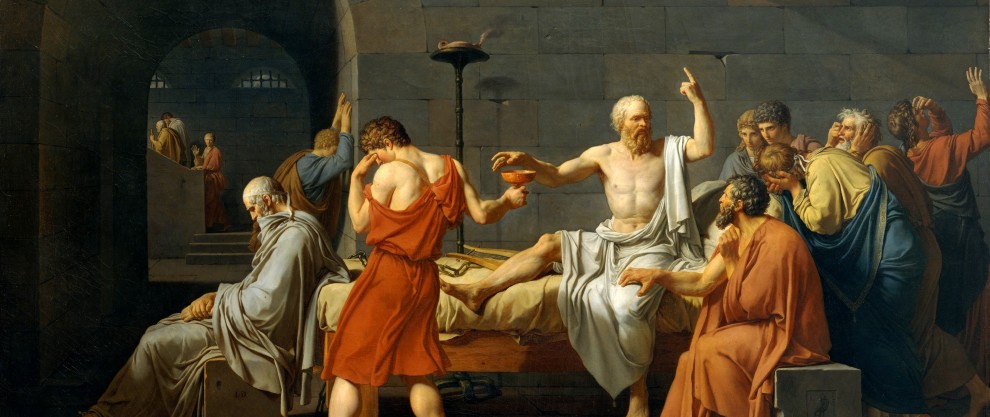“The unexamined life is not worth living,” said Socrates. In fact, it might be the most famous thing he ever said. If you wanted a Socrates T-shirt, button, or bumper sticker, this is the phrase that would go on it.
Socrates wasn’t good at sound bites. His preferred philosophical style was the interrogation, and he could most often be overheard asking questions with the form, “My friends, what is ________ ?” No matter what you were talking about, Socrates would grab ahold of the most important noun and start worrying it with questions about its essence. If you thought you knew the answer, he would keep hassling you until he convinced you that you didn’t really know. It’s a technique that brings a certain harsh clarity, but “What is X?” just doesn’t make a good slogan.
According to Plato’s telling of it, Socrates said the famous sentence, “the unexamined life is not worth living” during his trial in 399 B.C. He was 70 years old, and the city of Athens had him on trial for “corrupting the youth of Athens” by “teaching them not to believe in the gods in whom the city believes.” Socrates spoke in his own defense, and it didn’t take him long to confound his accusers by showing that they didn’t even know what they meant by “gods.” But though he won point after point at the philosophical level, Socrates did not prevail in court. He was found guilty, and the jury named the penalty as death (Socrates suggested a different penalty: free meals for life). They wanted him to promise to stop doing philosophy, and he said he’d rather die. So it wasn’t a very long trial.
And there, toward the end of his penultimate speech in Plato’s Apology, knowing there’s nothing he can say that will give him an honorable alternative to the death penalty, he says this:
If I say that it is impossible for me to keep quiet because that means disobeying the god, you will not believe me and will think I am being ironical. On the other hand, if I say that it is the greatest good for a man to discuss virtue every day and those other things about which you hear me conversing and testing myself and others, for the unexamined life is not worth living for men, you will believe me even less. What I say is true, gentlemen, but it is not easy to convince you.
Notice that Socrates doesn’t just come right out and say it. He says, “Here are some things that you won’t believe me if I say.” It’s not quite the dramatic delivery we would want, with Socrates played by Mel Gibson, yelling “THE EXAMINED LIIIIIIIIIIIIIFE!” as he goes to his death.
The original Greek of the phrase could be translated more literally as “the unexamined life is not livable for a man.” And the root of the word for “unexamined” (exetazein) is not one that shows up much in Plato’s writings. It probably has a military background, and suggests something like a drill instructor inspecting the ranks. And in context, Socrates isn’t so much talking about examining his own life, as hassling the men of Athens: “it is the greatest good” to be “conversing and testing [another form of the verb exetazein here] myself and others” about virtue. Why? Because the unexamined life is not worth living for men, or the course of life that is not subjected to exacting scrutiny is not a humanly livable life.
It’s still a fine motto for your philosophy club. But viewed in context, this Socratic saying doesn’t suggest “it’s nice to have lots of leisure time for navel-gazing” so much as it indicates that philosophy is a calling to honesty and critical thinking, even at great cost.
This post was originally published on February 4, 2010. It has been republished as part of our ten year anniversary celebration.
